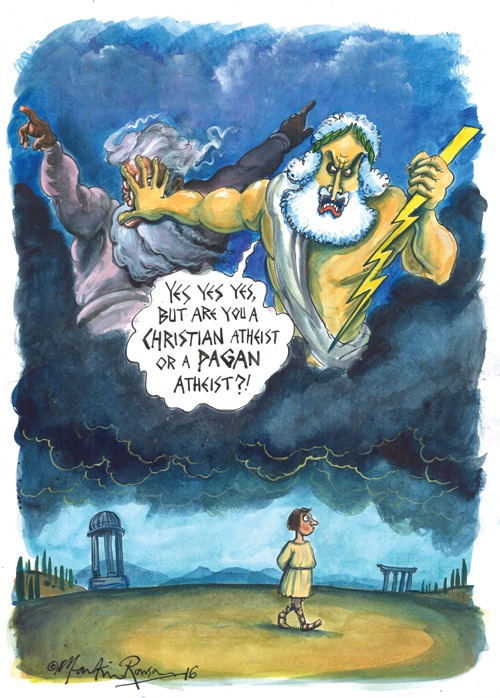
This article is a preview from the Summer 2016 edition of New Humanist. You can find out more and subscribe here.
The humanist approach to life is sometimes seen as a very recent thing – the product of the Enlightenment of Europe, rooted in the modern West, dependent on the Christian tradition for its context and content, even (in the allegations of its detractors) parasitic on that tradition. Nothing could be further from the truth and regular readers of New Humanist will be no strangers to the timeless and global nature of the humanist world-view. Long before there was Christianity, the beliefs and values that constitute humanism had formed the perspective of millions of people around the world in Europe, Asia and China, to name just those regions from which we have ancient written records.
“Who is it paints the peacocks, who is it makes the cuckoos sing?” asked the materialists of the Charvaka school in India 2,300 years ago, answering, “There exists here no cause except nature.” They were rigorous naturalists, seeing no need for belief in gods to explain reality, and their anti-clericalism is as fierce as any espoused by the partisans of the French Revolution. When the Chinese teacher Mencius, a disciple of Confucius at about the same time, sought the explanation for human morality, he hypothesised no divine law-giver but saw human morality as natural, rooted in our biology, in our instincts: “The feeling of commiseration is the beginning of humanity; the feeling of shame and dislike is the beginning of righteousness; the feeling of deference and compliance is the beginning of propriety; and the feeling of right or wrong is the beginning of wisdom. Men have these Four Beginnings just as they have their four limbs.” As the influence of these Chinese and Indian manifestations of humanism spread on the other side of the world, in ancient Europe, too, we can trace a full-blooded humanism.
In his excellent book Battling the Gods: Atheism in the Ancient World, Tim Whitmarsh focuses specifically on atheism in ancient Europe. Ancient Greek and Roman atheism has been sidelined, he believes, because it has been in the interests of Christians for the past 1,500 years, as it is today, to pretend their faith is timeless; because it is in the interests of atheists to claim their beliefs are cutting edge, the products of a modern scientific approach; and because generally we have lost popular knowledge of the classical world throughout our culture. He wants to combat this, both for the truth’s sake and to give back to the modern non-religious something of their heritage.
Just under 1,000 years of ancient European thought are covered, mostly in the Greek world and mostly through profiles of individual thinkers. Whitmarsh is an admirable pen portraitist, bringing these characters to life with elan. In the history of Greek religion he wants to “restore to life” the sceptics of the ancient world and his brisk pace carries us along on a journey that seems like a progression.
Whitmarsh starts by establishing the nature of the Greek gods. Greek atheism differs from modern European
atheism as it reacts against a different sort of religion. Greek myths had moral purpose but they were not sacred texts; the stories are dynamic and flexible according to context. The myths were philosophical, playful and, Whitmarsh writes, “experimental” (a highly perceptive and provocative description). There was no concept of “sin” in Greek religion and no commandments issued from the Greek gods.
Religion was, for the most part, not focused on morality in the sense that monotheistic believers or adherents would understand religion today. Although many myths had etiological purposes, it was not through their organised religion but through their schools of philosophy that the Greeks inquired into the nature of right and wrong and the nature of reality, too.
Like the Norse gods, the Greek gods were not omnipotent – they could in principle be defeated. This allowed thinking to develop that could unravel claims about divine power. With the coming of the arts, the gods could be depicted and imitated by humans. The line between the gods and humans in myth had always been permeable (humans of legend acquired cults, modern athletes were hymned, heroes in stories were deified) and Hellenistic kings were (quasi-)deified. This allowed for the idea that the gods were originally great men who portrayed themselves as gods in their reigns and whose self-portrayal as such endured. The existence of Hellenistic schools of philosophy into Roman times allowed the case for atheism to be fully systematised.
The narrative reaches a pinnacle in an excellent chapter on Epicurus – a character who, in the author’s words, can “quicken the pulse of any humanist” – and culminates in a chapter on the early Roman empire. In that multicultural melting pot, atheist beliefs were not controversial and even socially conservative establishment figures might express them. There is a hint that atheism may have been on its way to vanquishing theism altogether but the book ends as we know it must, with the coming of Christianity – that oppressive force that destroyed so much of the classical humanist tradition.
Although the overall narrative is strong, the individual chapters are like pieces of a mosaic and the full picture doesn’t ever cohere. This is no fault of the author: we can’t fully excavate the nature of Greek humanism because of the lack of sources. What we can do is discern an array of non-religious approaches to life.
Whitmarsh writes with scholarship and confidence and I wished for only two changes to his book. The analysis could have focused more often on what was present in the social and religious landscape of the time. This is done sporadically – for example, with analysis of how the competitive nature of Greek society fostered critical thought, or of the effect of cultural exchange with the east. It would have been fascinating to gain a greater understanding of the ways in which the conditions for the emergence of the ideas explored might parallel the conditions that were obtained in classical India, ancient China, the Arab golden age, or Enlightenment Europe at the time of analogous intellectual developments in those places.
Second, there is a problem in the book’s use of the concept of “atheism”. In his writing on atheism, Richard Dawkins has said that although it was possible to be an atheist before Darwin, it was only possible to be a fully intellectually satisfied atheist after Darwin. For this reason and others, many of the figures described by Whitmarsh are deists – they reject supernatural ideas of ongoing divine intervention but accept an original divine designer – rather than full atheists, and some of them are even theists.
The result is that “atheism” often does not feel like the best word for the matter under discussion; rather it is scepticism, anti-clericalism, humanistic morality, science, or the idea of free inquiry. The field of inquiry for the book could be framed differently: by deploying the concepts of humanism as a world-view (Whitmarsh’s characterisation of the “playfully subversive humanism” of Socrates is a flash of analytical brilliance) and deism as an approach to the question of God, the whole might have been brought into greater focus.
These are minor points. Whitmarsh’s book deserves to be read for its verve and quality but also because the more the existence of the rich history and heritage of humanist thought is known by the public, the better it will be for society. The ever-growing proportion of people who are non-religious need to know that their world-view is not a novel one, solely the creation of modern science, but a position that has been adopted by millions of people around the world. They need to know this not just because it is true but because it helps to give confidence and rootedness to those who can often be made to feel as if they are cutting themselves off from their heritage, rather than – as we really are – rejuvenating a perennial human view.
“Battling the Gods: Atheism in the Ancient World” by Tim Whitmarsh is published by Faber & Faber

